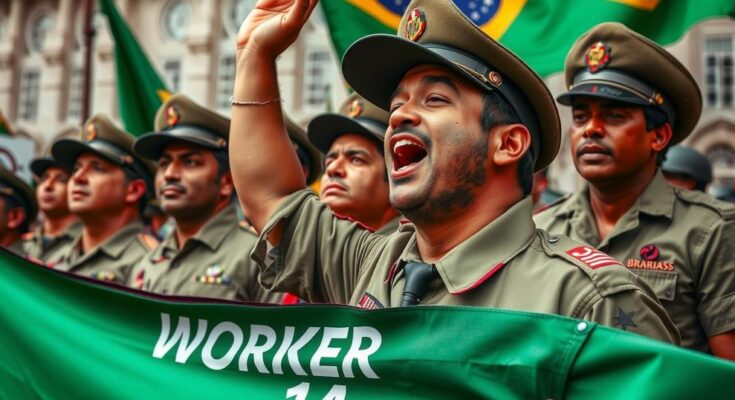Two years after the coup attempt in Brazil, the Workers Party commemorated the event by inviting military leaders, which has drawn criticism for potentially undermining democratic principles. Lula’s rhetoric intertwining nationalism with military cooperation reflects a political strategy aimed at obscuring ongoing social crises and the military’s role in past authoritarian actions. As tensions rise, both domestically and internationally, effective strategies are needed to safeguard democracy and address the needs of the working class.
Wednesday marked the second anniversary of the January 8, 2023, coup attempt in Brazil, which was orchestrated by former president Jair Bolsonaro along with certain military factions. The Workers Party (PT) government organized a commemorative event aimed at recognizing the role of the Armed Forces, seeking to reinterpret their involvement as guardians of democracy. This reach towards the military is viewed critically, as the military itself was deeply embroiled in discussions regarding the coup against the elected government, demonstrating a troubling nexus between governing powers and undemocratic forces.
President Luiz Inácio Lula da Silva, addressing the assembled guests including senior military leaders, emphasized the need to view the military as defenders of national sovereignty. This narrative, however, glosses over the acute social and political crises that Brazil faces while evoking the notion of “national unity.” Such rhetoric echoes past military regimes that employed similar slogans to justify oppressive measures against dissent. Furthermore, Lula’s alignment with military figures raises concerns regarding his intentions to stabilize a government fraught with contradictions.
The PT’s depiction of the military as protectors of democracy disregards substantial evidence of their involvement in plotting to unseat Lula’s administration. The recent arrest of military leaders connected to assassination plots against Lula and his cabinet members underscores the severity of the situation. Lula, in a notable twist, dismissed the coup plotters as “a bunch of irresponsible people,” failing to acknowledge the implications of the military’s actions.
Additionally, Supreme Court Justice Alexandre de Moraes attributed the coup attempt to freedom of speech online, advocating for increased regulation of the internet. In stark contrast, Lula criticized the concept of social revolutions, highlighting a preference for stable bourgeois democracy over revolutionary social change. His claims that Italian words were not spoken by workers in historical revolutions indicate a dismissal of the genuine working-class movements that shaped Brazil and the world.
The historical context of the military dictatorship in Brazil emphasizes the significance of Lula’s remarks, as he distorts the achievements of the working class. His failure to address significant advances made by labor movements stands in opposition to his narrative. The government’s ceremony, lacking attendance beyond state bureaucracy, reflects a disconnect with the public.
As the global political landscape shifts, with Donald Trump’s potential influence resurfacing and the domestic right-wing factions emboldened, Lula’s administration finds itself under increasing scrutiny. Bolsonaro’s announcement of his invitation to Trump’s inauguration can exacerbate tensions in Brazil, regardless of how the government reacts. The threat posed by far-right movements grows more pronounced, suggesting that rather than merely revisiting past failures, there exists a pressing need for actionable strategies to combat rising fascism and military influence.
The political contradictions underpinning Lula’s administration and the PT signal a fragile state of democracy in Brazil. Lula’s approach to align with military forces reflects an inability to engage with the pressing social needs of the populace. Consequently, without a genuine effort to transfer power to the working class through revolutionary means, the country risks falling prey to future authoritarian attempts.
The context of this article is deeply rooted in the political instability and historical legacy of military coups in Brazil. The attempted coup on January 8, 2023, by Bolsonaro supporters, including military figures, marked a critical juncture in Brazilian politics. It symbolized a clash between democratic governance and authoritarian ambitions, mirroring past military regimes that utilized national unity slogans to suppress dissent. Lula’s current administration grapples with the repercussions of these violent attempts to subvert democracy while attempting to maintain control amidst rising tensions both domestically and internationally. The Workers Party, historically advocating for the working class, now finds itself navigating precarious alliances, particularly with military brass, whose historical roles have been intertwined with political oppression. As global pressures mount, especially with the return of figures like Trump, Brazil’s political landscape reveals an urgent need to address underlying social and economic inequities that have been aggravated rather than alleviated by recent political maneuvers.
In conclusion, the second anniversary of the January 8 coup attempt in Brazil highlights the complex interplay between military power and democratic governance under Lula’s administration. The Workers Party’s attempt to evoke national unity through military collaboration raises significant questions about the genuine defense of democracy. As Brazil confronts rising threats from far-right factions, it is imperative that meaningful alliances with the working class be forged to ensure the protection of democratic ideals. The political landscape remains fraught with contradictions, necessitating a comprehensive strategy to address deep-seated social injustices.
Original Source: www.wsws.org




